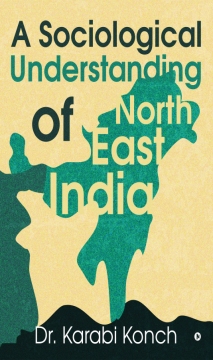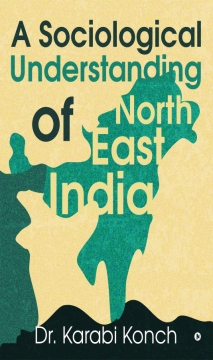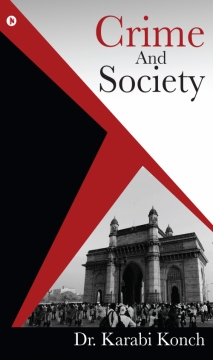
- Discover books
- For Writers
-
For Writers
-
Indie Author Championship
-
Challenges
Writing Contests
- Get Started

"It was a wonderful experience interacting with you and appreciate the way you have planned and executed the whole publication process within the agreed timelines.”
Subrat SaurabhAuthor of Kuch Woh Pal -
-
-
IN
- India
- Singapore
- Malaysia
- 0
Dr. Karabi Konch
Karabi Konch is an Assistant Professor, Department of Sociology, Mahapurusha Srimanta Sankaradeva Viswavidyalaya, Nagaon, Assam. Her areas of interest are Criminology, Sociology of Indian society and Social Psychology. She has a Ph.D degree from Department of Sociology, Dibrugarh University, Assam, with specialization in Criminology. She received doctoral fellowship from Indian Council for Social Science Research (ICSSR) for the same. She has published a good number of articles and research papers in scholarly journals and souvenirs of national and international level. She also participRead More...
Karabi Konch is an Assistant Professor, Department of Sociology, Mahapurusha Srimanta Sankaradeva Viswavidyalaya, Nagaon, Assam. Her areas of interest are Criminology, Sociology of Indian society and Social Psychology. She has a Ph.D degree from Department of Sociology, Dibrugarh University, Assam, with specialization in Criminology. She received doctoral fellowship from Indian Council for Social Science Research (ICSSR) for the same.
She has published a good number of articles and research papers in scholarly journals and souvenirs of national and international level. She also participated in conferences, workshops and symposiums in different disciplines.
Read Less...Crop your profile image

A Sociological Understanding of North East India
Books by Dr. Karabi Konch
A Sociological Understanding of North East India attempts to discuss socio-cultural unity and diversity, demographic features, and the linguistic scenario of Northeast India.
Traditional institutions of the northeastern region such as family, marriage, religion, and polity are described with examples.
The concept of identity and the identity conflict of different ethnic groups, homeland and homeland politics, tribal autonomy, and other related co
A Sociological Understanding of North East India attempts to discuss socio-cultural unity and diversity, demographic features, and the linguistic scenario of Northeast India.
Traditional institutions of the northeastern region such as family, marriage, religion, and polity are described with examples.
The concept of identity and the identity conflict of different ethnic groups, homeland and homeland politics, tribal autonomy, and other related contemporary issues in the northeastern region have been included in this volume.
The promotion and development of the tourism sector and the tourist destinations in the eight states have been studied, and different government policies and programs of Northeast India are also incorporated in this volume for discussion.
A Sociological Understanding of North East India
Books by Dr. Karabi Konch
A Sociological Understanding of North East India attempts to discuss socio-cultural unity and diversity, demographic features, and the linguistic scenario of Northeast India.
Traditional institutions of the northeastern region such as family, marriage, religion, and polity are described with examples.
The concept of identity and the identity conflict of different ethnic groups, homeland and homeland politics, tribal autonomy, and other related co
A Sociological Understanding of North East India attempts to discuss socio-cultural unity and diversity, demographic features, and the linguistic scenario of Northeast India.
Traditional institutions of the northeastern region such as family, marriage, religion, and polity are described with examples.
The concept of identity and the identity conflict of different ethnic groups, homeland and homeland politics, tribal autonomy, and other related contemporary issues in the northeastern region have been included in this volume.
The promotion and development of the tourism sector and the tourist destinations in the eight states have been studied, and different government policies and programs of Northeast India are also incorporated in this volume for discussion.
Crime and Society
Books by Dr. Karabi Konch
Crime and Society presents the subject matter of Criminology, its field and scope, its historical development and of law, law enforcement agencies and the criminal justice system.
Concentrated on different relevant aspects of criminology such as crime, deviance and delinquency, it attempts to analyze different conscientious factors behind the involvement of youth in crime. Crimes committed by the youth are one of the most burning social problems
Crime and Society presents the subject matter of Criminology, its field and scope, its historical development and of law, law enforcement agencies and the criminal justice system.
Concentrated on different relevant aspects of criminology such as crime, deviance and delinquency, it attempts to analyze different conscientious factors behind the involvement of youth in crime. Crimes committed by the youth are one of the most burning social problems in the present epoch. In the transitional period from childhood to adolescence and adolescence to maturity, the youth generally face different socio-economic problems. Many violent upheavals of youth personalities are thus to be expected in the transitional period.
Some of the most vulnerable forms of crime such as murder, dacoity, theft, fraud, kidnapping, different crimes against women such as rape, molestation, dowry harassment and witch-hunting, infanticide and foeticide, crimes against children such as child trafficking, child abuse, etc., and cyber-crimes are areas included within this work.
Some important theoretical approaches of criminology have also been discussed in this volume. This book will definitely help students, scholars and academicians to gather information and knowledge for their academic discourse.

Are you sure you want to close this?
You might lose all unsaved changes.
Select from one of our global stores to continue
 India
India
 Singapore
Singapore
 Malaysia
Malaysia
Warning Message
The items in your Cart will be deleted, click ok to proceed.













